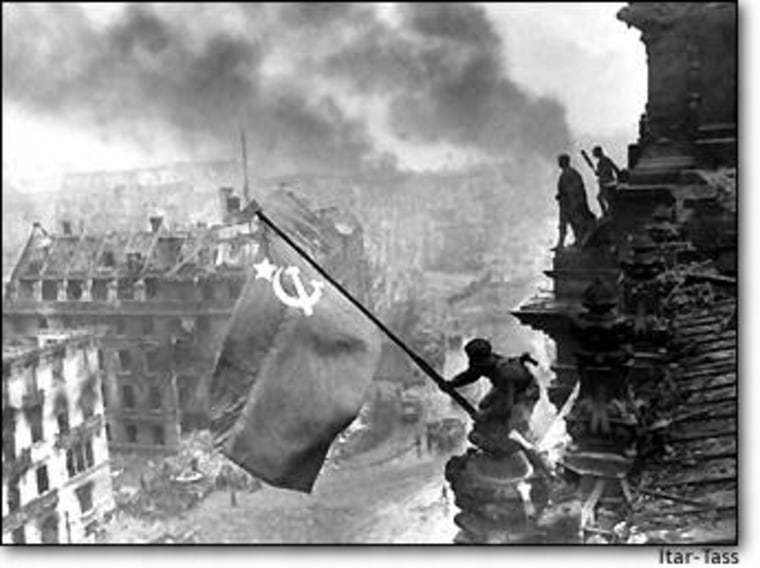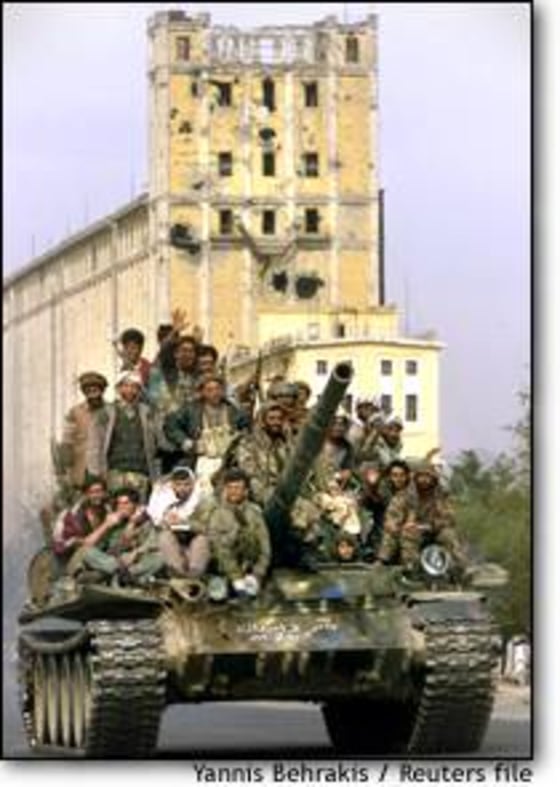The Taliban’s retreat from northern Afghanistan and many of its large cities raises several serious questions. By far the most important of them, at least from an American standpoint, is this: How can the United States control the victorious rebel army now that Northern Alliance troops control the centers of power? From Troy to Palestine, from Berlin to Vietnam, the history of postwar settlements shows that the leader with troops on the ground ultimately calls the tune.
IF POSSESSION is nine-tenths of the law in peacetime, it often embodies the law in the aftermath of war. Advancing armies may pledge tolerance, amnesty and free elections as they roll into enemy capitals. They may promise a broad coalition government and an equitable distribution of the spoils. They may even promise their foreign backers contradictory things about their various interests. But once their troops hold the airports and the highways, once their police run the cities and prisons, the power resides with the occupying power.
History is littered with the broken promises of wartime allies, many of them made to the United States. The example cited most often is the carve-up of Europe negotiated in during World War II by the three main Allied powers, a marriage of convenience led by Stalin, Roosevelt and Churchill. At the Yalta Conference in 1944, a time when Soviet forces already were marching beyond their prewar borders into Eastern Europe, Churchill proposed “spheres of influence” in various states that obviously were going to end the war occupied by the Red Army. Stalin politely accepted and promised free elections after a reasonable period.
That period turned out to be four decades.
Will the marriage of convenience with the Northern Alliance lead to promises of convenience, too? It is far too early to tell. From Washington to Tehran to Beijing to Moscow, powers great and small are expecting a dividend on their investment in the Northern Alliance. Most of them have invested far more than the United States, and finding common ground among these four powers — beyond a mutual loathing of the Taliban — is going to be a challenge.
CHICKEN BEFORE THE EGG
In fact, the world is jumping the gun if it deems the Taliban’s retreat this week a victory. It is progress, no doubt. But remember: The Soviet Union controlled Afghanistan’s cities utterly from 1979 to 1989. Similarly, the U.S. military controlled South Vietnam’s cities. It did neither army any good in the end. Guerrilla warriors don’t need ministry buildings, cafes and high-rises to wage war.
InsertArt(1913495)The Northern Alliance is a very different creature from either of the regimes backed by superpowers in Vietnam or Afghanistan. Unlike the Soviet puppet regime in Afghanistan during the 1980s, the Northern Alliance is not the local dupes for a foreign ideology (not yet, at least). Nor does it fit the mold of the South Vietnamese regime, an elite, corrupt clique of Catholics in a nation of Buddhist peasants. For better or worse, the Northern Alliance is a homegrown movement opposed to a homegrown tyranny. Foreigners manipulate both, but the reaction of Pashtuns in Kabul to the advancing Northern Alliance troops suggests it is the Taliban, and not Pakistan or the United States or Russia, that is hated. An alliance victory, most appear to believe, at the very least is a chance for a new start.
A NEW REALITY
But a start at what? Washington wanted that question answered before the Northern Alliance posted tanks at Kabul’s ministry buildings, and that is perhaps the most worrisome development of the past week. A U.S. defense official told me the rapid withdrawal of the Taliban simply was not anticipated by U.S. war planners. “If we had, we might have had a plan to put more troops on the ground, at least to help keep things under wraps as these cities fell,” he said.
It is too late now. The political wing of the Northern Alliance, the United Front for the Salvation of Afghanistan, is still talking the talk: broad-based coalition, elections, the whole litany of Western liberalism. But its troops aren’t walking the walk. Scores are settled in Mazar-e-Sharif, perhaps unavoidably. But the single most important pledge that Washington (and its dubious ally in Pakistan) managed to win from the Northern Alliance before the Taliban retreat began was a promise not to enter Kabul before a postwar political settlement was hammered out. Like so many wartime promises past, that one wasn’t worth the breath expended to express it.
MISPLACED TRUST
None of this should surprise U.S. war planners, though history suggests their foresight isn’t always perfect. In June 1999, as Serbian resistance collapsed and NATO forces poured into Kosovo to fill pre-arranged zones of occupation, Russia sent a regiment of paratroopers who had been assigned to peacekeeping in Bosnia hurtling into Pristina, the capital of Kosovo. Suddenly, a Russian zone of occupation had to be grafted onto NATO’s plans. Subsequent diplomatic negotiations minimized the damage, but the fact that it happened had proven extremely embarrassing to U.S. commanders.
U.S. military history is replete with such examples. It is probably unfair to blame Roosevelt for buying Stalin’s promises with regard to Eastern Europe — after all, Russia’s occupation of the East was a fait accompli by the time they were made. It’s harder to imagine why Gen. Eisenhower, when told by Churchill that he should stop pursuing the German Army in Bavaria and head for Berlin, dismissed the idea as “political interference.” Henry Kissinger, in his book “Diplomacy,” recounts the event, noting that when Stalin got wind of it, he sent Eisenhower a message agreeing with the general’s principled stand. He then told his own military commander, Marshal Zhukov, to be in Berlin within two weeks. The Berlin Wall is a direct result of this misplaced trust.

Stalin did it again to Truman in Korea in the closing days of the war, ordering his troops to take the then-Japanese colony just days before Hiroshima. After the war, Stalin promised elections in the “Soviet zone” of Korea. It’s now called North Korea.
ROSE-COLORED FIELD GLASSES
Gullibility may be a byproduct of decency. Either way, again and again, U.S. negotiators and war planners have been snookered by such pledges. Kissinger himself accepted North Vietnamese promises in 1973 that reunification with the South would come only by mutual consent. U.S. troops left, and North Vietnam’s army ensured that consent in 1975.
None of this means the Northern Alliance is bent on ignoring the interests of its backers, whether they be American or Russian, Iranian, Chinese or Indian. However, a quick glance at that list of backers should be enough to suggest how many directions this victorious army expects to be pulled.
The Northern Alliance is a ragtag collection of militias, some of which hate each other as much as they hate the Taliban, some of which hate the United States as much as they hate Osama bin Laden. Some fought as much for access to poppy fields as to any city.
You can write this off in a Cold War manner by saying, “Yes, they’re drug lords, but they’re our drug lords.” But are they? Maybe they’re Iran’s drug lords, or India’s? The question is not yet answered.
Hopefully, a multiparty, cross-community, democratically elected government will take over the country once a United Nations peacekeeping mission is complete.
But it should surprise no one if these wartime promises turn out to be promises of convenience.
Indeed, in Afghanistan, it would be remarkable if that did not happen. The primary U.S. interest right now, beyond the special forces search for bin Laden and the Taliban leadership, should be in getting a professional military force other than the Northern Alliance on the ground in Afghanistan so that facts cannot be created by ambitious local commanders.
Until then, it would be wise to keep the champagne on ice.
